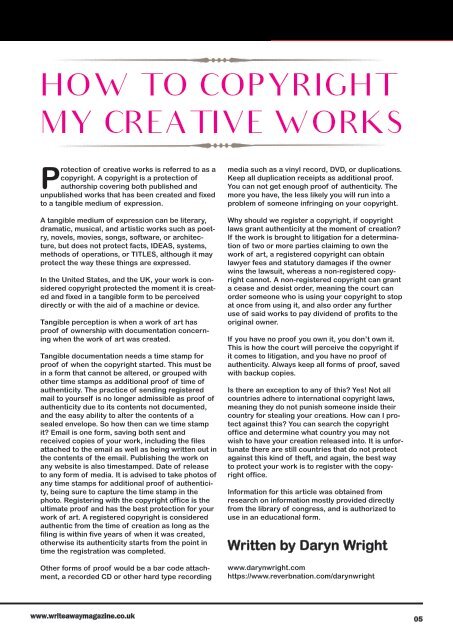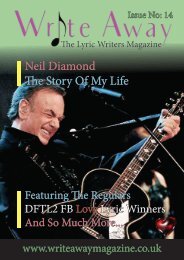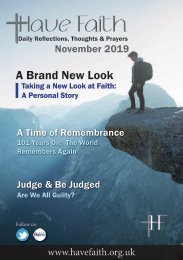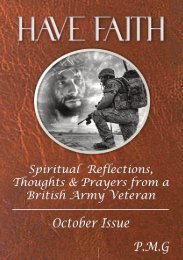You also want an ePaper? Increase the reach of your titles
YUMPU automatically turns print PDFs into web optimized ePapers that Google loves.
HOW TO COPYRIGHT<br />
MY CREATIVE WORKS<br />
Protection of creative works is referred to as a<br />
copyright. A copyright is a protection of<br />
authorship covering both published and<br />
unpublished works that has been created and fixed<br />
to a tangible medium of expression.<br />
A tangible medium of expression can be literary,<br />
dramatic, musical, and artistic works such as poetry,<br />
novels, movies, songs, software, or architecture,<br />
but does not protect facts, IDEAS, systems,<br />
methods of operations, or TITLES, although it may<br />
protect the way these things are expressed.<br />
In the United States, and the UK, your work is considered<br />
copyright protected the moment it is created<br />
and fixed in a tangible form to be perceived<br />
directly or with the aid of a machine or device.<br />
Tangible perception is when a work of art has<br />
proof of ownership with documentation concerning<br />
when the work of art was created.<br />
Tangible documentation needs a time stamp for<br />
proof of when the copyright started. This must be<br />
in a form that cannot be altered, or grouped with<br />
other time stamps as additional proof of time of<br />
authenticity. The practice of sending registered<br />
mail to yourself is no longer admissible as proof of<br />
authenticity due to its contents not documented,<br />
and the easy ability to alter the contents of a<br />
sealed envelope. So how then can we time stamp<br />
it? Email is one form, saving both sent and<br />
received copies of your work, including the files<br />
attached to the email as well as being written out in<br />
the contents of the email. Publishing the work on<br />
any website is also timestamped. Date of release<br />
to any form of media. It is advised to take photos of<br />
any time stamps for additional proof of authenticity,<br />
being sure to capture the time stamp in the<br />
photo. Registering with the copyright office is the<br />
ultimate proof and has the best protection for your<br />
work of art. A registered copyright is considered<br />
authentic from the time of creation as long as the<br />
filing is within five years of when it was created,<br />
otherwise its authenticity starts from the point in<br />
time the registration was completed.<br />
Other forms of proof would be a bar code attachment,<br />
a recorded CD or other hard type recording<br />
media such as a vinyl record, DVD, or duplications.<br />
Keep all duplication receipts as additional proof.<br />
You can not get enough proof of authenticity. The<br />
more you have, the less likely you will run into a<br />
problem of someone infringing on your copyright.<br />
Why should we register a copyright, if copyright<br />
laws grant authenticity at the moment of creation?<br />
If the work is brought to litigation for a determination<br />
of two or more parties claiming to own the<br />
work of art, a registered copyright can obtain<br />
lawyer fees and statutory damages if the owner<br />
wins the lawsuit, whereas a non-registered copyright<br />
cannot. A non-registered copyright can grant<br />
a cease and desist order, meaning the court can<br />
order someone who is using your copyright to stop<br />
at once from using it, and also order any further<br />
use of said works to pay dividend of profits to the<br />
original owner.<br />
If you have no proof you own it, you don’t own it.<br />
This is how the court will perceive the copyright if<br />
it comes to litigation, and you have no proof of<br />
authenticity. Always keep all forms of proof, saved<br />
with backup copies.<br />
Is there an exception to any of this? Yes! Not all<br />
countries adhere to international copyright laws,<br />
meaning they do not punish someone inside their<br />
country for stealing your creations. How can I protect<br />
against this? You can search the copyright<br />
office and determine what country you may not<br />
wish to have your creation released into. It is unfortunate<br />
there are still countries that do not protect<br />
against this kind of theft, and again, the best way<br />
to protect your work is to register with the copyright<br />
office.<br />
Information for this article was obtained from<br />
research on information mostly provided directly<br />
from the library of congress, and is authorized to<br />
use in an educational form.<br />
Written by Daryn Wright<br />
www.darynwright.com<br />
https://www.reverbnation.com/darynwright<br />
www.writeawaymagazine.co.uk<br />
05


















